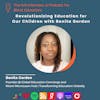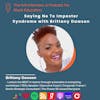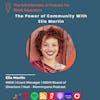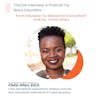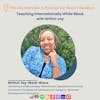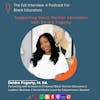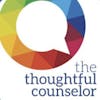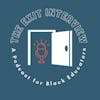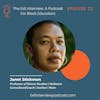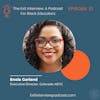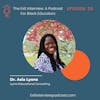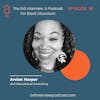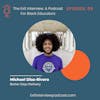
Episode 41: Saying No To Imposter Syndrome with Brittany Dawson
In this episode, Dr. Asia Lyons interviews Brittany Dawson, discussing the pivotal moments that l...

In this episode, Dr. Asia Lyons interviews Brittany Dawson, discussing the pivotal moments that led Brittany from the classroom to becoming a leadership coach. They explore the challenges faced by Black educators, the emotional and financial hurdles in the teaching profession, and the transformative decision to leave traditional teaching roles. Brittany shares her personal journey, offering insights into her initial attraction to education, the realities of working within public and charter school systems, and finally transitioning to a coaching role that aligns with her passion for making an impact beyond the classroom walls.
First of all.... have you signed up for our newsletter, Black Educators, Be Well? Why wait?
Amidst all the conversations about recruiting Black educators, where are the discussions about retention? The Exit Interview podcast was created to elevate the stories of Black educators who have been pushed out of the classroom and central office while experiencing racism-related stress and racial battle fatigue.
The Exit Interview Podcast is for current and former Black educators. It is also for school districts, teachers' unions, families, and others interested in better understanding the challenges of retaining Black people in education.
Please enjoy the episode.
Peace out,
Dr. Asia Lyons and Kevin Adams
Brittany Dawson: [00:00:00] In what world, while I do recognize parents should always be able to advocate for what's best for their child, what does that show to the students who are in the room and everyone around? And I, I remember feeling just like a big, I don't know. I just felt like, man, like this really sucks. And so I had to get on bending knee in my war room.
Okay. To be like, God, I need you to do a greater work in me so I can show up tomorrow. But it just really made me question my place and the value of teachers and educators in this world. So that was like the big moment for me in my third year.
Dr. Asia Lyons: Welcome to the Exit Interview, a podcast for Black educators, where we, Dr. Asia and Kev, delve into the crucial but often overlooked conversations surrounding the retention of Black educators. While the spotlight shines in recruiting efforts, we turn our focus to the stories of those who've left the field of teaching.
The exit interview aims [00:01:00] to spark dialogue among school district administrators, school unions, families, educators, and anyone else passionate about fostering a more inclusive and supportive educational environment. Join us as we elevate these narratives, shedding light on the challenges faced by black educators.
and provide invaluable insights for the future of education. Welcome to The Exit Interview.
Welcome back to another episode of The Exit Interview, a podcast for Black educators with your host, Dr. Asia Lyons and another FIRE guest. Folks, I feel like my Denver connections are out here showing up for the podcast and I want to know where the rest of y'all at. Like we have another 49 states I need to be hearing from, but today We're talking to Brittany Dawson.
Brittany and I met via LinkedIn, via Tara, downtown, a co working space for women, and she's here on our podcast. So happy to have you on the podcast, Brittany. [00:02:00]
Brittany Dawson: Hey, Dr. Aja, nice to be here with you as well. Shout out to the Denver Connections, okay? Really grateful to be able to share my story with you all.
Dr. Asia Lyons: Yeah, super excited. So as always, we jump in with that very first question of, so you were an educator. How did you decide education was for you? What did you do in education? How long were you there? We want to hear the whole story.
Brittany Dawson: Absolutely. Dr. Asia. So first of all, it's just amazing how fast time flies because.
For me, it feels like it was just yesterday that I started my journey in education. However, for me, I have to bring us all the way back to almost 10 plus years ago, where I initially wanted to pursue education. So even though I know we met in Denver, Colorado, I am originally from South Carolina, so I was born and raised there.
[00:03:00] I grew up in the Columbia, South Carolina area and then grew up mostly in the upstate area, which is the Greenville Spartanburg area. And in my high school experience, I actually got my start. in my professional world by my original goal of becoming a doctor, which is like really funny to think about now, but I originally got my start in college.
I was a pre med major, thought I wanted to like study biology and become the next Grey's Anatomy doctor, which I'm gonna be honest, the science was sciencing, the biology was biologying, and I realized that that just wasn't where my passion was. And so, I think a sophomore at the University of South Carolina at the time, and I had the opportunity to start volunteering in the school district in South Carolina.
And in particular, this role, they were looking for people to come in anywhere between one to two hours a [00:04:00] week and read to first grade students or kindergartners. And I remember at the time, I'm like a hairy college student. And I'm like, You know, barely making it through classes at the time. And I was just looking for something to give back.
So I started volunteering at the United Way of the Midlands Reading Consortium, which was an organization in Columbia, South Carolina. And I met my first student and I remember meeting him for the first time and picking him up from his classroom to read books and getting to know his teachers. It just sparked a different passion in me that I felt like I hadn't had prior to me transitioning from the pre med track.
I remember going back to my car just overwhelmed with emotion on the fact that in my community, there was a need not only to volunteer, but there was a career where [00:05:00] you could really change the lives of students. And so I actually remember that same week I went to the registrar's office. I changed my major from pre med to English education, and that's what really got my start.
So fast forward from that moment, I originally transitioned to be a high school teacher. So I started my experience in Teach for America Houston, shout out to MIT Affairs, in 2015 after I graduated, and I was teaching 9th and 10th grade English, which was super fun. So I'm sharing all of this backstory because if it wasn't for that initial entry and volunteering in my community, I don't know if I would have.
Been able to one, like feel like I can make a difference in the realm of education, but also serve communities that look like me and represented the population that I was from. So it was [00:06:00] very serendipitous moment where I shifted from what I thought I wanted to moving into a career where I was really able to make a difference for my community.
Dr. Asia Lyons: Okay, so first of all, shout out to all these folks who, where biology took them out, because I feel like you're the third or fourth person. You're like the third or fourth person on this. Yeah. No. And I get that. So many people come on and say, I wanted to be. a doctor or somewhere in the science field. They got to biology and it took them out.
They said, this is a no go for me, but we're super fortunate that you did have the opportunity to work with a young person at the United Way. Shout out to them. We have one here, of course, in the Maha United Way. And having that opportunity to transfer and do all the things to your classes, just kind of a backstory before we continue on.
You were in pre med and, you know, a lot of families love to tell folks like, my daughter, you know, my child, my whatever is in pre [00:07:00] med, they're going to be a doctor. When you told folks that you decided to become an educator, what was that response like?
Brittany Dawson: Thank you for bringing us back to that reality because the thing is, the response was very realistic.
And when I say realistic, I mean, there was this shift in, I would say, pride and confidence You know, I'm studying to be a doctor and I'm a biology major. And I remember in certain spaces, especially being a black woman in the South that carried so much social stock in comparison to me saying, I changed my major from science.
To become a teacher. And at the university, the only major that they had was elementary education. So if you want it to become a high school teacher, you had to major in the subject that you wanted to teach. And then you had to get what was called a cognate, which we didn't have a [00:08:00] minor for high school education, but in essence, it served as you getting similar credits, like a minor.
To pursue your career in teaching. So for me, it was like a huge pivot because I went from many considered a very stable, successful, high paying, high earning position to teaching, which it's like, it shouldn't be that way. But that's really how I was experiencing that. So, you know, I do remember pivoting from English, uh, from pre med, excuse me, to English.
A lot of people were like, well, do you want to be a writer? Do you want to, you know, maybe teach English as a professor? I mean, like, what's your plan? And I remember constantly saying, I want to teach English. I want to be a high school English teacher. And the why behind that was, even when I was in high school in South Carolina, I actually didn't meet my first teacher.
black teacher until seventh grade. And I didn't [00:09:00] meet my next black teacher until I was like in the ninth grade and there were all my English teachers. So it made an indelible impression on me to not only fall in love with English, but just be that teacher that I felt like I had. Growing up in South Carolina, and I feel like many, many teachers enter the profession wanting to pay it forward in a similar way and pour back into the same communities that were able to make us who we are.
Dr. Asia Lyons: Yeah, that makes a lot of sense. And it also makes a lot of sense when you talk about this idea of like having a lot of pride about being a doctor, saying that, making that announcement. I've said this so many times on the podcast where I told my dad I wanted to be a teacher and he said, you're too smart to be a teacher.
Yeah. Why would you waste your intelligence on being a teacher, which is really a shame because to believe that being an educator is a less than profession, just because America treats it as such, is like a missed opportunity for so many folks to have [00:10:00] great teachers, like you're saying your seventh and ninth grade teacher, English teacher.
So I appreciate you sharing that. And I'm glad that despite other folks feeling this need for you to do something that seemed cooler or more prestigious that you stuck with. what you wanted to do. So you became a 9th and 10th grade English teacher. And then tell us what happened after that. Like, how long were you in the classroom?
Were you, did you do other things such as coaching? Tell us about that piece as well.
Brittany Dawson: Yes. Just to kind of add some timeline pieces. So I graduated from the University of South Carolina in 2015. Actually put me in schools. I got a email from a Teach for America recruiter stating that I would be a great fit for the program.
And at first I'm like, okay, is this spam? Like, what is this? And so I ended up meeting with the recruiter, uh, from Teach for America. And he shared more about. [00:11:00] Just the mission, right? You know, serving two years in a community that's considered at promise and being able to really make a difference as a high school teacher.
So in 2015, about a year and a half before I graduated, I submitted my application. You know, went through a very extensive, it was like a multi month process of interviewing and explaining my why and doing bunches of reading about topics like critical race theory and culturally relevant pedagogy. And ultimately the goal was to assess fit for our mindset, but also the willingness to do the work.
After that timeline, I was accepted into Teach for America. I noticed that I was placed in Houston, Texas. So that is where I got my initial start in the classroom. I was teaching ninth grade English in the Houston Independent School District at a [00:12:00] school called Sam Houston Math, Science and Technology Center.
And I remember The first day walking into the classroom hit me that I'm responsible, uh, you know, for human beings. And I remember it was this real moment. Like, I read all the books, I talked to all the OG teachers, you know, watched all the videos, but nothing could prepare me for that day one. And I remember when the bell rang, I saw all of these students.
coming in into the hallway and students coming in and I saw my name, Ms. Dawson on their roster. It just bolstered this heightened level of social responsibility and service to do right by every student that walked in. And I'll be very honest, It tapped in into a deeper love, students who historically are not given that same love and care, if that makes sense.
And [00:13:00] so, I will be very honest, it was one of the most life altering experiences I ever had, especially being in my early 20s, okay? To be responsible for other human beings while also making sure that I'm doing right by them, uh, by the system. So, I'm also going to be really honest to say, You know, that first year, I was the textbook definition of that right eyed, bushy tailed, idealistic teacher of like, we're gonna change the system.
Um, I kinda like to say I was like the real life Janine from Abbott Elementary. Very upbeat, and I still am, but in the education system, you know, it was always try new ideas and let's like bring the community together. I got some, you know, supporters who were really on board with that, but I also had some really honest conversation from veteran educators who were like, the system isn't built like that.
You know, you can't, if you want to do that Ms. Dawson, [00:14:00] you can, but be ready to get that credit card out. Or. We've been trying to build a parent teacher coalition for years, but the district doesn't have the funding for these initiatives. So it was a really sobering reality of not only the vision of what it meant to be an educator, but the realities of what it actually meant to do that within the bureaucracy that's the school system.
So I can't say that, you know, it got to me 100%, but. I will say it was that experience that still kept me in the classroom three years later from my first year.
Dr. Asia Lyons: Yeah, I appreciate what you're sharing and that idea of, you know, this fresh start. Teachers love a good fresh start in a brand new classroom. The name tags, as an elementary school teacher, I don't want to say I was Janine coming from Detroit public schools and seeing my own education.
Yeah, it was a whole different, I was more like, what's the kindergarten teacher's name?
Brittany Dawson: I can't remember her name. [00:15:00] Yes, I know who you're talking about. Gosh, the name removed is not on my head right now. I know exactly who you're talking about though.
Dr. Asia Lyons: Yeah, that I was like the kindergarten teacher from day one, but I wouldn't rain.
Like I, if people were eager, excited, I did not rain, you know, reality onto people. It was like, I'd laugh for everyone else, but I just kind of understood. Just from my own experience, unfortunately, in Detroit public schools that, you know, a lot of the funding and things that I maybe wanted to do was not going to happen in a traditional way.
But we always make a way, right? We always figure things out. Sometimes we do pull out that credit card. So that is what it is. So you were in the classroom for three years. Was that the time that after that, that you decided that it was time to shift out of teaching or you moved on to do something else inside of the teaching space?
Brittany Dawson: Yeah. So I left the classroom in my fourth year. And so from 2015 to 2017, I was an English teacher [00:16:00] in Houston, Texas through Teach for America. So for those who are not familiar with that, Teach for America does operate from a minimum of two years at your placement school. So I fulfilled my commitment and then many, I decided I wanted to continue teaching after that third year.
From 2017 to 2018, I moved from Houston, Texas to Charlotte, North Carolina. I want it to be a little bit closer to home, but also not at home. If you know, you know. Okay. So I was like, all right, like city. So in that third year, from high school and started teaching middle school, which quite frankly, it felt like my first year all over again.
Okay. I mean, humble, humble. And I thought I knew what I was doing. They humbled me down. All right. I mean, I think that's also why now I know patience and structure because just working with middle school students, it was a really [00:17:00] great practice of being. Uh, very consistent with the routines and the structure.
So, uh, the difference with that though, is in my first two years, I was teaching at a traditional public school. And then in my third year, I was not only teaching a new grade, but I was also different grades, same topic. But this was my first experience at a charter school. So all of those components, it was very, very different than, than what I was used to, and quite frankly, really hard.
There was an expectation to just give, give, give. And while that I do believe in the power of being connected to your work and your why, it was really hard for me to set boundaries sometimes as a teacher. And anytime that I got sick or wanted to rest, there was this like unwavering teacher guilt that I should be doing something with my predictivity time.
Rather than resting. And I'll be honest, it took me years to unlearn [00:18:00] those voices, but that's really what I took away in my third year. So I left that school and was really excited to move into my fourth year. And so from 2018 to 19, I was at a different charter school where I was still teaching middle school English.
And my fourth year, I was just hitting my stride. I can't lie to you. I had the classroom management was good. I was building relationships with students. I just felt like a veteran yet. I was not. As passionate with the emotional labor of being a teacher. It was getting very hard for me to take care of just my basic needs financially with the salary that I was making.
And just quite frankly, I think I had outgrown that part of my work and I was seeking for a different way to serve people in education without being a teacher. Uh, and I'm going to be really honest, you know, [00:19:00] at that time, I was The only career path for educators was to either, at least this is what I was told, but you're going to become a principal as team lead, instructional coach, you build your own school and that's it.
And I'm like, well, I want to do any of these things, but I know I'm passionate about this thing. So it was in my fourth year that I learned a little bit more about leadership coaching and found an opportunity to be a leadership coach to first and second year teachers through Teach for America. And that is actually where my passion for education was still able to be alive, but also not having to be, okay, a teacher of record for our calendar year.
That was like my timeline from 2015 to 2019 and how I was able to transition from the classroom but also still be connected to a similar mission.
Dr. Asia Lyons: Yeah, I love that. This idea of, well, it's not like if you want to move up, first of all, move up, right? [00:20:00] That term. And then to say from the classroom to, like you just said, a coach and the coach to the, maybe a dean to assistant principal, right?
And This idea of, well, what if there's another option? And if I want to think about doing something different, which is why we invite so many people on the podcast to have so many different stories, because we want to keep asking that question of what does different look like, whether that be inside of a traditional education space.
or leaving altogether. And so, on that same note, can you tell us, you're not in the classroom anymore, you're no longer in education in the traditional sense, tell us what made you decide it was time to leave teaching?
Brittany Dawson: That is such a good question, because I think that there were many, like, micro moments that led to the decision.
Okay, I won't take us down that rabbit hole today, but I will start with, I want to say the big domino [00:21:00] pushed me to being like, it's time to go. So let's take us back to my third year in the classroom. I'm working at a charter school and I remember one day, unfortunately there was a student who, due to I think the parent's work schedule or some personal things, they needed to get dismissed early.
And the campus at the time had really specific guidelines on the process for signing your student in and out. I remember in particular, a parent was not satisfied with the rules of the campus and decided that they were going to tell me about it. They not only told me about it, but they were basically cussing me out, unfortunately.
And while this was happening, I was teaching a class, so I, you know, kind of gave the student some work to do while that was happening. But also, I'm trying to keep my composure while this is happening outside. And so, you know, luckily I was [00:22:00] able to communicate this to the team and, you know, they were very supportive and apologetic of that interaction.
But I remember going home that day just being so sad. And Felt like a kick around toy and felt so powerless because I'm like, in what world, while I do recognize parents should always be able to advocate for what's best for their child. What does that show to the students who are in the room and everyone around?
And I, I remember feeling just like a big, I don't know. I just felt, man, like this really sucks. And so I had to get on bended knee in my war room. Okay. To be like, God, I need you to do a greater work in me so I can show up tomorrow. But it just really made me question my place and the value of teachers and educators in this world.
So that was a big moment for me in my third year. And then just some other micro moments of, you know, just financially at the time, this was several years ago, but I was [00:23:00] making about, you know, 40, 000 at the time. And it seems like a lot of money until it's not, you know, you break that down by weekly. Yeah, Mike.
I'm making a thousand dollars struts, uh, 600 ways. And some days I had more month than money. And I had some friends at the time who actually transitioned into educational technology, for example. And I'm looking at them on Instagram and they're like going on trips. And, you know, we'd really love for you to like, hang out with us here.
And I'm like, I barely had money to go to Ingles this week to get my groceries. So I just. It was a struggle that was really hard for me because on one hand, I was so passionate about serving and like being the best teacher that I can be. And I was feeling good doing the work. When I was looking at my bank account, while money isn't everything, it does afford some flexibility.
So that was really the year that I decided I wanted to get serious [00:24:00] about my transition and figure out where I'm going. So that year I actually started applying for some leadership subpositions. And I ended up getting rejected. I was looking for a dream job at the time. And I remember when I got that, no, I was super heartbroken.
You start telling yourself stories like, you know, what's wrong with me. I'm passionate about this. Why can't they see this? And, you know, I really want to make a difference. And so I ended up calling my previous manager through Teach for America. A shout out to Nicole. She really talked me through this. So full circle moment, but you know, she was really supportive and asked me, you know, Brittany, what is it that you actually want after the classroom?
How can you really focus this next year to build the experience that you want? And how can you start now? And she probably doesn't remember all of that conversation, and I love that because it's [00:25:00] like, she really did make a difference for me there. What I remember as I, you know, wiped off my tears that day, I was like, she's actually right.
What is it that I want? You know, how can I leverage my classroom experience to transition into something differently? So that is where my fourth year in the classroom comes in because while I knew that was going to be my final year, I wanted to be very intentional with the projects I took on to build the case of my leadership coaching.
So You know, my fourth year, for example, I coached like two novice teachers of the year and, you know, supporting them in their classroom management, I was, you know, taking on, I was actually the track coach at the time, which was really fun and got to step into leadership with the women's track team and just stretched myself with different projects in the coaching realm.
And so when the role opened up to join as a leadership coach, I was [00:26:00] I actually was blessed and had two offers. I had one offer in Connecticut. The second offer was in Baltimore. I chose Connecticut and that was really the journey that led me to where I am today, which is in the leadership coaching, nonprofit management consulting space.
And interestingly, while I'm left as a teacher, I literally used every approach that I did as a teacher in facilitating conversations, building relationships, etc. So I'm grateful for that experience, but It was definitely time for me to leave, and now I feel much more compensated, much more calm in my decision, and really grateful to have even had that experience.
Dr. Asia Lyons: There are so many nuggets in there, in this part of your story that you're sharing, and I wrote so many things down. The first thing that I want to go back and talk about, or just kind of flush through, is this idea of parents not seeing [00:27:00] teachers. as human, right? And having this, the situation happen with you where you had a dysregulated adult embarrassing you in front of your students, the students experiencing the shame, all these emotions, because that is a thing that sometimes comes up on this podcast.
Sometimes folks talk about the parents being a catalyst for pushout, right? This idea of being paid 40, 000 in 2000. What year
Brittany Dawson: was it? 2018. And I, luckily I had a extra body in the space, so I was sharing split and white. So I'm like, okay, but yeah, it was real tough. Yeah.
Dr. Asia Lyons: Yeah. That's why, because I remember my first year of teaching in 2006, I was paid 32, 000, 2006, I was paid 32, 000 and you got paid 8, 000 more all those years later.
Yeah. And so this compensation is always a conversation that comes up. I also think it's so interesting. [00:28:00] That you took that situation where you were feeling deflated about not being able to get the dream job you want, talking to a mentor, a good friend, which shout out to people who, first of all, talk about their issues with other people and share and get that mentoring support, whether through a colleague, a close friend, a whomever, and then deciding like, okay, this is the direction I want to go in.
What can I do right now to build up my resume so that I can get to where I need to go? And for some of us, we need to get out of the classroom immediately for all the reasons. But for those who are saying like, okay, well, I'm going to be here for another year. I feel really good about the next two years.
How can I, I love that. How can I build up my leadership skills? Okay. I can be a track coach or a basketball coach, or I can build up and create a club or sponsor club for a school or. And you also talked about supporting novice teachers, right? Now paid or unpaid, that's, all of that depends on folks and what they can afford to do in their [00:29:00] capacity.
And I would never tell people to work for free, but either way, if that's something that you're thinking about leadership, like how do we collect these leadership experiences where we already are, that doesn't involve a ton of emotional labor that we aren't willing to take on. Right? And so that's that creative thinking that, as you said.
Those experiences helped you to get to your next step and then helped you to do what you're doing today. And so when we get back from our commercial, we'll talk about the next part, which is what are you doing now? And all of the favorite things that I love to ask. So we'll be right back after this break.
Hey there, beautiful people. It's me, Dr. Aja. Before we dive back into our conversation, Kev and I have something exciting to share with you. Are you a dedicated Black educator or support Black educators? Well, if so, we've got some great news for you. We're thrilled to introduce the latest addition to our podcast community, the Black Educator Be Well newsletter.
It's a space dedicated to all things Black [00:30:00] educator healing, wellness, and more. We believe that taking care of our Black educators is crucial, and this newsletter is designed to do just that. Picture this, exclusive insights into self care practices tailored for Black educators, inspiring stories from fellow teachers, who've overcome challenges and tips for creating a positive and supportive environment at work and at home.
Subscribers will get early access to our upcoming podcast episodes, special interviews with guests, and even some surprise giveaways. How do you become a part of this amazing community? It's easy. Go to xainterviewpodcast. com or check out the link in this episode's show notes. Now let's get back to the conversation.
All right, y'all welcome back to the Xainterview, a podcast for Black educators. We're here with Brittany Dawson. She's given us all of the tea, all the themes, her travels, TFA, leadership coaching. The third year, the fourth year, we were, we doing all the years. We're
Brittany Dawson: hitting up all the milestones, okay? We [00:31:00] won't miss a thing, okay?
Dr. Asia Lyons: We're not missing nothing. This is what I love about this show. We get to be nosy. And so my next question, we always want to start off the second part in this place of like really expressing joy and gratitude. So can you tell us Is there a Black educator that you would like to shout out on our show?
Brittany Dawson: Oh, so many, so many, so many.
So I want to shout out my first Black educator, Mrs. Bruce Goss. She was my seventh grade English teacher. She just rocked a bold, short, natural haircut in early 2000s, which for some of us here, we know that was such a bold move, given the fact that I'd say it's fairly recently. And that we're seeing more of that around.
She was very firm, but fair and was just no nonsense. And there was something about that, that as one of two black students in that classroom, it [00:32:00] made me feel really safe. So shout out to Mrs. Bruce, guys. And then my second shout out, I want to shout out the Miss Latrice Thompson, who was my ninth grade English teacher at Greenville Technical Charter High School.
She is the teacher who shared books like Toni Morrison and Maya Angelou and all of the black greats that outside of the traditional white literary canon, that's really where I went to town and got my written on. So shout out to both of these educators. Uh, they poured into me and I just am sending y'all blessings all the way from where I am.
Dr. Asia Lyons: Oh, I love that so much. Yeah, that's beautiful. And so our next question, you started this before the commercial, a little break. What are you doing now? Fill us in on all the things, who you're supporting. We want details.
Brittany Dawson: Yes. Well, I love this because I guess that while I left the [00:33:00] classroom intentionally to be challenged and have more work life balance and just be enjoy of service.
I am very, very blessed to have been able to find that transition because I know it does take time. And so currently I'm now the founder and CEO of Brittany Dawson Coaching, which is a Denver based professional coaching, speaking, and training organization where I am on a personal mission to unlock the best in people through high energizing and actionable trainings.
And so I primarily have worked closely with non profit organizations, technology, startup sector, government sectors on a variety of needs. And this was really where I get to do my passion work, which is just bringing out best in people. And it's interesting because prior to me pivoting to more of a [00:34:00] group coaching and workshop space, I am really blessed to have been able to offer both one on one coaching as well as group trainings with organizations like Teach for America and was even able to work this past year in, and not just literally this past year, I know we just got here, but when I first moved here to Denver, I was able to support some Teach for America, Colorado, us recent teachers on just getting ready on how to literally be the best teacher they can be post COVID, and was even able to give some opening remarks to kick them off for the year.
So it was this turnaround moment to not only be a teacher who left the classroom, but also to speak words of encouragement to the next group of educators who are literally here in Denver, Colorado right now. So I'm really blessed to have been able to do that. I'm on the side, but I'm not doing my business.
I love to speak and [00:35:00] inspire people. So really happy to share that. I recently completed my first ever TEDx talk in February, which was all about battling imposter syndrome. And man, I mean, take it as someone who left the classroom. Imposter syndrome was all up on my timeline. I can't even lie to you.
Doubted whether or not I would find a career outside of teaching. You know, had to really rebuild my confidence to step into new industries. It was that action that has allowed me to be my own entrepreneur today. So that is what I've been doing now. That's what's my passion work. And again, I got that start in the classroom and now I'm bringing that here in a different way.
Dr. Asia Lyons: Yes, yes, yes, yes, yes. So I'm going to ask a question that I feel like Folks listening in may want to ask you, which is, okay, sounds like a plan, I'm with you, I'm in here, I'm supporting novice teachers, I'm a mentor, and [00:36:00] I think I'm ready to move into coaching, right, and do something that you're describing.
Do you have one or two pieces of advice that you could give folks who are thinking about taking that move and not necessarily quitting teaching altogether, but coach, thinking about moving into coaching people outside of their school or district. Anything that you felt was super helpful that you've learned in your experience or someone has told you?
Brittany Dawson: Oh, absolutely. So I want to start with the first one and I want to say. That this might be controversial and that's okay, but I believe in saying the things. If you are wanting to become a coach, I challenge you to get rid of the idea that you have to be certified in order to be an effective coach. While yes, you can get the degree, you could get the certificate, you could watch the show.
It's all knowledge, right? But at the end of the day, all coaching is how can you [00:37:00] move someone from where they are to where they want to be. That's the first step. And secondly, if there are gaps in between, how can you coach them through it to still arrive to where they want to be? And let's be honest, every teacher is a coach.
You have hundreds of learners, right? That you have to adapt and motivate and have those accountability conversations with, right, to get them to their goal by the end of the year. So as long as you can build that transformation, I would not focus on investing in a bunch of degrees, a bunch of certificates to give you the validation that you are a nurse.
You already enough. You're an educator. You have that experience. So I would encourage you to just not lean in on that and just go up there and go for it. So that would be my first word of advice. Um, and then my second word of advice would be to start where you are slash build your [00:38:00] experience where you are, whether that's coaching one teacher to coaching friends or hosting some type of virtual coaching experience where you're.
Solving a problem within 20 to 30 minutes that also counts as coaching as well. And in my experience, the best way to get into the coaching is to coach as many people. And I'm going to be honest, that's really where you're going to know who and what type of client am I best positioned to serve. And most importantly, what clients.
Am I not best positioned to serve, or more directly, which ones are like an energy sapper? What am I not passionate about? And I think that can also give you more choice and autonomy on where you serve your gifts because ultimately that is where this is all about. So those would be my two words of advice.
Don't get hung up on the certifications and just start where you are and create where you can exactly where you are.
Dr. Asia Lyons: We love [00:39:00] you out here. We love you because you know, listen, teachers love a professional development. We love a FTE, CDU, PD. We love all the little micro this and micro that. And I've told folks the same thing you said, because it's just a stalling tactic.
Like you're stalling, just get out there and do it. And I love this idea of coaching your friends because that still counts as coaching and gaining experience from coaching people. Like, listen, I need, this is what I'm trying to do. Do you have a issue or a challenge that you want me to support you with?
Can I practice with you? I love that idea. You don't have to go far unless you don't have any friends, then we have a whole different problem, but I love, love, love that idea. Um, starting where you are. I love the idea of getting rid of this idea of certificates. Yeah, we can spend so much money on certifications and programs and masterclasses and these, [00:40:00] all these things.
And some things are very valuable to learn within community and you may have to end up paying for some things, but just stacking upon stacking upon stacking of certifications, it's not gonna make the thing any easier. Eventually, you're gonna have to leap. So I absolutely love that. Last question. What's been bringing you joy these days?
Brittany Dawson: So much things. First of all, in Denver, we know we've been in some snow, and then it's like sunny, and then it's like hail. Oh. So what's been bringing me joy as of late has been the sunshine and spending my time outdoors. So something that I am deeply connected to as a result of transitioning from the classroom is creating rituals for myself to stay anchored.
And for me, that looks like meditating in the mornings. For me, that looks like having at least two to four times a week I'm outside. And for me, that looks like riding [00:41:00] my bike and listening to some music. Most recently it's been our good sis, Tyler. Shout out to the Afro beats queen. That's been my thing.
And I'm listening to music and being outside. And I'll be honest, while I think I could have done a better job with that as an educator, I felt like I was just in like my freeze mode to where once I was done with the day, I get on the bike was like, Too far gone for me. So I want to be really honest to say that it's taken me quite frankly, over the past 10 years to get re regulated within myself and identify those rituals so that even as a business owner, you know, I'm also not in the tug and push and pull of hustle culture.
And I'm choosing to soften within a culture that encourages the hustle. So that's, what's been keeping me and bringing me joy. It's been the outdoors, traveling, eating good food, spending time with my partner and [00:42:00] just living my best life. And also spreading joy anywhere I can go.
Dr. Asia Lyons: And you've spread joy today, for sure.
A hundred percent. Tell us how we can find you. If we want to reach out. Maybe, uh, receive some coaching as a business, an individual, all the things. How can we find you?
Brittany Dawson: You can find me on Instagram. I've just created my business Instagram page, finally made my way here. Uh, I can be found at Brittany Dawson coaching at Instagram.
I can also be found on LinkedIn. If you just type Brittany Dawson coaching, you should see my page pop up. And I can also be found on my personal website. Guess what? That website's called www. BrittanyDawsonCoaching. com. All right. So that is where you can find me. My email is also, guess what, BrittanyDawsonCoaching at email.
com. And if you want to set up a chat or if you want to learn more [00:43:00] about my experience, I don't believe in gatekeeping either. So if there's any resource I can offer to anyone listening, definitely feel free to reach out. And just so happy I was able to share my story today.
Dr. Asia Lyons: All right, folks, you heard it from Brittany yourself.
She's out here doing great things. She's dropping beautiful gems for all of us to take and do something with. Reach out to her if you need some support, if your business needs support. She is definitely a person who does not gatekeep because we had a conversation just recently and she was a tremendous help to me.
Beautiful spirit, beautiful person. This is an episode of The Exit Interview. We hope to see you around. And if you are a Black educator, former Black educator who'd like to be on our podcast, reach out at bewellatlionseducationalconsulting. com. All right, peace. Thank you for tuning in to another episode.
We hope that you've gained valuable perspectives and a deeper understanding of [00:44:00] the conversation surrounding Black educator retention. As we conclude this episode, we encourage you to join our Patreon to support our work. Plus, as a patron, you receive bonus episodes, March giveaways, and much more. Stay engaged with us on our social media, sign up for our newsletter in the show notes, take a look at our YouTube page, and interact with us on our website.
Remember, the stories we've shared today are just the beginning, and your participation is vital for the future of education.

Brittany Dawson
Founder | TEDx Speaker
I'm Brittany Dawson I'm a former educator turned solopreneur and TEDx Speaker who's on a mission to unlock the BEST in teams through actionable and energizing workshops, trainings, and keynotes! I've designed and facilitated 100+ trainings across 8+ sectors with organizations like: Constellation Brands (think Modelo/Corona Extra), Colorado Women's Chamber of Commerce, and Amazon. I'm a huge Drake, Afrobeats, and r&b fan!
New to The Exit Interview: A Podcast for Black Educators?
Here are some great episodes to start with.


















